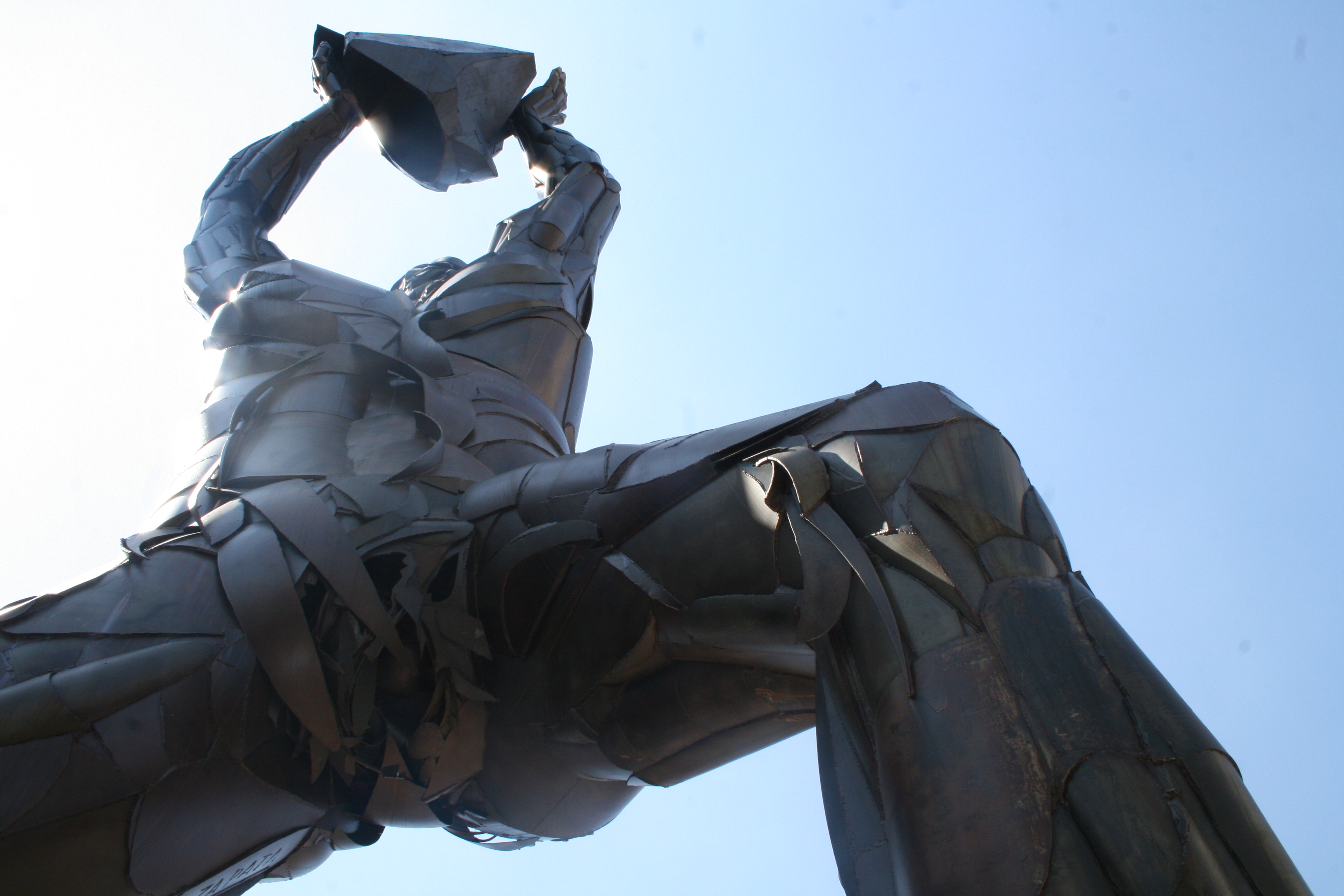Editors Note: You are in for a treat. Taral Wayne, one of Canada’s best known fan artists – nominated for a Hugo Award for Best Fan Artist no less than eleven times, winner of the Rotsler Award, artist and co-writer of the furry comic Tales of Beatrix, interior illustrations for Rudy Rucker’s novel Spaceland and restorer of Vaughn Bode’s fanzine art – likes to write stories about fandom. As Taral stated in his email to me – “One sort of fan reads fanzines for gossip and convention reports, the other sort looks for book reviews and articles on the authors. Virtually nobody reads fanzines for fiction, much less fiction about fandom.” Which may be because fiction about fans is an acquired taste. You’ll need to put on your suspension of disbelief hat and set it to anything goes. Prepare for an introduction to fiction that is decidedly fannish, but not about fandom at all….
Fly on the Wall
by Taral Wayne
There were seldom any new faces at the Pump and Bucket. When there were, they were invariably met with a degree of cautious friendliness and, if all went well, a resumption of the customary good cheer.
That is, until the day a portly, lugubrious-looking gentleman in an old-fashioned, pin-stripe suit and muttonchop whiskers slid into a nearby seat that plainly indicated he knew who The Flying Squad were, and why they regularly gathered there. Seated in the shadow of an overhanging pot of ferns, the stranger looked like a carved Buddha … or a retired British major from the army, which was more likely.
He sat quietly in the leather-covered seat at an empty table for two, and, when the waiter came, ordered a German Bock. The waiter went away, and a minute later returned with a reddish lager in a plain glass. The sideburned Buddha sipped his beer. Although he didn’t appear to take an impolite degree of interest in the nearby goings-on, clearly, clearly he was listening in on the conversation. It was hard not to notice.
Martin Molle was the first to speak to him.
“Say, you look as though you’ve been following our conversation all along. Are you a science fiction reader, by any chance?”
“That I have been,” the Buddha boomed. “And I have been following your conversation – I hope you don’t mind. It’s not often, these days, that I hear the names John Brunner or J.G. Ballard spoken – it’s always Harry Potter this or Dr. Who that or Indiana Jones the other thing … You can’t find anyone who says anything intelligent about science fiction – just the popular stuff, you understand?”
“Sure. That’s why we’re here every Wednesday night. We’re the local science fiction group, actually.”
“I’d noticed there was a rather large crowd here every week. Didn’t pay you any mind, at first, but then I began to pick out certain words from the background buzz, and I became interested. Aubrey James Bartholomew Ainsley, OBE,” he said, holding out a beefy hand with immaculately groomed nails. “But everyone at the office calls me Barty … if they’re my superiors … Sir James if they’re not. That’s my little joke – you may call me Barty.” A round of introductions followed.
From his accent, Ainsley was from the north country, somewhere – not a Yorkie, more likely Lancs. “Newcomer to the Bucket, are you?” asked Martin, skirting the issue.
“No. I’ve been coming here, on and off, for years. For the last few years, though, I’ve been out of the country, and only just begun dropping in regularly again. That’s how I noticed your group.”
One of the other members of The Squad became interested. Sheila McAuley leaned over to ask, “Your work takes you out of the country often?” She batted patently false eyelashes.
“It does,” answered Ainsley, “but It’s not something I can talk about. Official Secrets Act, you know?”
“Oh.” It was not the answer Sheila expected. Nor anyone else.
“Sure you’re not some sort of spy, then, are you?” asked Kripps from farther down the table. Not known for subtlety, the question dripped with his characteristic sarcasm. There was laughter from his end of the room.
Ainsley relented just a little, then. “No, no … nothing like that. Government service, of course, but … an agent provocateur, not at all. Haven’t carried a gun since that Falklands affair. Back in ’82, when I … well, never mind that. It’s all in the public record, anyway. It will have to do if I say my job involves keeping my finger on the pulse, and my ear to walls.” Having established a rapport, the Buddha-like stranger pulled his chair over to join The Squad.
It was Townsley who made the fatal remark, a moment later.
“So, you’re sort of a fly on the wall.”
Ainsley’s face held a peculiar expression for a moment, then he replied, “Not exactly. Not exactly. But funny you should bring up that particular turn of expression. I was recently thinking of my aunt Ersibeth – “ he pronounced it ‘awnt’ “ – and her devilish delusion that she was a member of the species Musca domestica and, of course, her unfortunate tragedy.” He took a long draft of his Bock, waiting to see if the floater bobbed. No one spoke a word. One and all, he had The Flying Squad hooked.
“A fly, you mean?” queried a puzzled Molle.
“To be precise, a common housefly is what she believed she was. We thought she was just being daft at first.” Ainsley pronounced it “dawft.” “She would only act up once in a while, buzzing in your ear or tickling your arm by walking her fingers up and down. As time went by, though, she fell into her fly persona more and more often, and persisted long after there ceased to be any sort of humour in it. A few years ago, we realized that it had been some time since Aunt Erzy – as we called her – had been herself.
“We consulted doctors, naturally. At my late wife’s insistence, we even called in a spiritualist, but it was no use. ‘Dementia’ said the medical profession. ‘Beelzebub,” said the spiritualist – before I threw her out of the house, unpaid. The one thing they both agreed on was that there was nothing to be done about Auntie’s condition except more visits and more money. At least the doctors were covered by the National Health Service, which is more than I can say for the table-rapper.
“The family finally had no choice but to learn to live with Aunt Erzy’s delusion. It wasn’t such a hardship, really … once we grew used to it. She would spend most of the waking day wandering around the house, her face to the wall, arms bent like so – ” Ainsley demonstrated “ – and her fingertips on the wallpaper like so.” He demonstrated with hammy fingers splayed out, their tips pressed lightly against his end of the table. “And then she’d ‘walk’ with her fingertips, like this.
“The poor old thing would make her way around the room in that fashion for perhaps half an hour, or sometimes half the day. On other occasions, she might take fright after only a minute, and take wing. She’d ‘fly’ out of the room, so to speak, buzzing to herself, wandering in erratic circles and loops until she found the door. Many’s the time, as a boy, I saw poor Aunt Erzy fly in and out, up and down stairs, only to land again just a few inches from where she had fled. So she spent most of her days. After a while, we hardly took notice of her.
“The one thing that Auntie did that was sure to be a nuisance, however, was on those occasions she insisted on landing on one of us. There you would be, sitting, reading the business section of the newspaper, when suddenly the ten tiny pads of her fingertips would ‘land’ upon your shoulder – so lightly that you almost didn’t know they were there. Then, with nervous little advances, her fingertips would dance down your sleeve and over the back of your hand, where she would gambol among the coarse hairs. The temptation to swat Auntie was very hard to resist … very hard. But it wouldn’t do to upset her, so whenever you could no longer stand the tickling, you had to brush her gently away. Auntie would buzz around the room for ten or twenty minutes … but, inevitably, you would feel her ten timorous fingertips on your shoulder or sleeve again, and it would start over.
“We among the family grew used to it, naturally. We also grew to take considerable amusement in it when there were visitors in the house, and Auntie would be attracted to their after-shave or perfume. They were always informed of Auntie’s … peculiarity … of course. Not that it ever prepared them for her attention, if they were so unlucky as to receive it. We watched the unfortunate soul as long as we could, maintaining poker faces on the outside while smiling with sadistic glee on the inside. After a while, we would spare the poor devil any further embarrassment by showing him the family ‘technique.’ Whenever Auntie was an especial nuisance, it never failed to draw her away by leaving out a sugar cube where she could find it! She would sit next to the end table or sideboard for hours at a time, one finger on the sugar cube as though feeding.
“For heaven’s sake, though, let’s not talk about the neighbor’s dogs! Although we’d spoken to them on several occasions, they would let the brutes wander around at will. One of us had to go out every morning to make sure the lawn and sidewalk out front of the house was clean, lest Auntie discover something ‘nasty’ to play with.”
A few po faces suddenly appeared around the table, and at least one fork hit a plate with a clank as it was put down in a hurry. “Please! I was having chocolate truffle,” said Myrtle Troup, revolted.
“Auntie’s affliction was mainly harmless, though,” Ainsley continued, unperturbed. “She injured no one else, and only rarely herself. One of those few times was the summer we were so badly plagued by genuine flies that we took action. We kept the swatters and spray out of Auntie’s sight, of course, but early one morning we were all woken by an unearthly scream that came from down in the kitchen. We tumbled down the stairs in housecoats and pajamas, slippers flip-flopping on the carpet and anxious voices exclaiming, ‘What in the world was that,’ and “For God’s sake, who do you suppose that was.’ Father stiff-armed the door and barged in like the retired police serjeant that he was, and we all crowded in behind him to discover the last thing any of us expected. There was Aunt Erzy in her night shift, standing barefoot on a kitchen chair, her head and arms and upper body all tangled in a roll of sticky flypaper hanging from the ceiling fixture! After that, we hastily removed the remaining flypaper from around the house and disposed of it.
“There was one thing that Auntie was positively afraid of … which made the following story all the more difficult to understand.
“One day, Aunt Ersibeth went out for her afternoon buzz, and, to everyone’s surprise, came home with a suitor. According to the young man, they had met in the city park a few days before. It was his custom to take lunch there, and he had a sweet tooth. No doubt, that was why Auntie was attracted to him. He had bought a sticky bun, as usual, and left it on the bench next to him, also as usual. Oddly, he rarely ate more than half his bun, and then left the rest. On this occasion, he noticed that our aunt was sitting next to his bun, her hand poised over it as though undecided whether or not to take it. ‘Help yourself,’ he said to her, whereupon she ‘landed’ and began to ‘feed.’ He laughed. It must have brought her back to herself, somewhat, because what she did next was so … well … normal. She took a bite of the bun, chewed it, then ate the rest up just as anyone would. ‘She doesn’t speak much,” said the young man. ‘I like quiet women who don’t screech and whine about.’ He also said that his name was Hounslow, and that he would like to see more of dear Ersibeth if he might.
“Of course, he had our blessing. It was just the thing for Auntie! We thought, perhaps, she had only needed a romantic interest all along. It was far from an orthodox relationship, however. The young man, Hounslow, was himself markedly peculiar. He was a salesman in an exclusive haberdashery, that specialized in silk undergarments, ties, gloves and socks. What was odd about it was that Hounslow would wear nothing else himself. He surrounded himself handsomely in silk. Even the lining of his wallet was shot silk. He was not vain, fortunately … nor ought he have been. Despite the perfection of his attire, he was not what was commonly thought good-looking. His eyes were close-set, small, jet black and beady, and the refraction of his thick-lensed glasses seemed to make them drift around to where they shouldn’t be. It was all too easy to count the same eye twice and come up with disconcerting results.
“That was not the end of it. Hounslow’s sweet tooth I have mentioned, but not that he rarely, if ever, finished any sweet he began. He would open a chocolate box, eat one or two and forget that it was there. Or else he’d order a tea and absent-mindedly shovel so many spoonfuls of sugar in it that nobody else would drink it, and then not take a single sip of it himself! Instead, he would idly watch insects gather around his tea or bun or biscuit, as though he took pleasure in their company.
“It seemed that Auntie Ersibeth had met her match in Hounslow, and that they were a perfect pair. Alas, it was not to be! The wedding was set for June, a band had been hired, a caterer found who was inexpensive enough to suit Grammaw Leda, but who could have known tat the ceremony would end as it did, in disaster? We should have seen it coming as soon as the minister pronounced them man and wife … but we weren’t listening to the words.
“The honeymoon was to have been in Paris, in the grand Hôtel Ubu … a wonderful old place of fin de siècle luxury, with a piano, brass banisters, molded plaster, surly managers, an elevator cage that hadn’t worked since Napoleon III’s time and Russian émigrés reading the newspaper in the lobby. The happy couple would not be able to leave for Paris until the next day, however, due to inclement weather in the Channel. They might have stayed the night in a London hotel, but we were an unconventional family, and the house was large and mostly empty. So, for the evening, Aunt Erzy and Hounslow were allowed Grandfather’s old room in the tower, the biggest in the house. His ghost would never notice, as it was habitually haunting the billiard room. Considering the occasion, among ourselves we thought it good fun to call it the ‘nuptial suite.’
“Next day we expected to see the happy couple off with the usual fanfare, but in the middle of the night a bloodcurdling screech woke everyone in the house! The scream had plainly come from the direction of Grandfather’s old room. We came running in night-shirts and pajamas, wielding heavy curtain rods and cricket bats and other improvised weapons, according to temperament, and all burst into the nuptial suite together.
“To our astonishment and horror, we found Auntie altogether in the altogether, trussed up like a sausage! And there was Hounslow, hovering over her with a ludicrously operatic carving knife, inching toward her bosom! As he looked up to see what all the commotion was, we saw that he was actually slavering – gobs of mucousy-looking saliva dripped from his chops! We put an end to this scene of Grand Guignol in pretty damn short order, naturally. To this day, we are unable to remove the unnatural bend from the living room fireplace poker.”
The Flying Squad was unusually silent after this revelation, the expressions up and down the table ranging from guarded to outright horrified. No one knew how to react, and all were waiting for a clue.
Which Ainsley gave them. Both barrels. “So the newlyweds never did go on their honeymoon, and Aunt Erzy went on believing she was a human fly. And Hounslow? The police bagged him, of course. Looking down at the matched luggage – a wedding gift that would never be used – we only then realized why Mr. and Mrs. Webb would never be. For Hounslow believed he was a human spider, you see.”
That’s when the pandemonium began.
And that was only the first of many Wednesday nights dominated by tall tales told by Aubrey James Bartholomew Ainsley. It was also the last time that the Pump and Bucket’s Flying Squad welcomed a newcomer without deep-seated, and understandable, suspicion.










